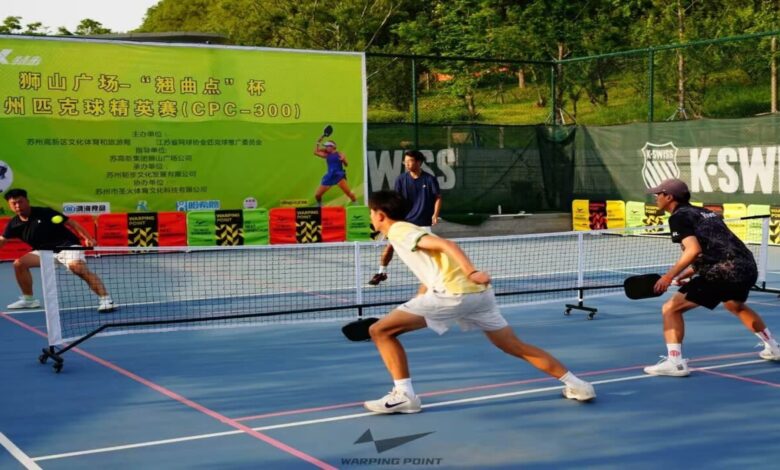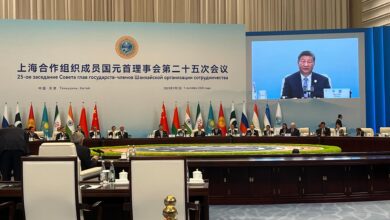Pickleball is just getting started in China

Sports club Suzhou Shishan opened the Chinese city’s first pickleball court in January 2024, according to the company.
Suzhou Shishan
BEIJING — While the U.S. pickleball craze is still going strong, China’s is only just getting started.
Online sales of pickleball paddles and related equipment in China have skyrocketed this year to an average of $1.2 million in monthly sales as of July — an increase of more than six-fold versus the year-ago period.
That’s according to data from WPIC Marketing + Technologies. The company helps foreign brands — such as Ohio-based food blender seller Vitamix and skincare brand iS Clinical from California — sell online in China and other parts of Asia.
“Pickleball’s rise in China reflects a broader shift toward active lifestyles and recreational sports participation,” said Jacob Cooke, co-founder and CEO of WPIC.
The racquet sport has been getting a lift from social media influencers and the resurgence of tennis in China, thanks in part to Chinese tennis player Zheng Qinwen winning the country’s first Olympic gold medal in tennis singles last summer, Cooke said.
Interest in tennis and pickleball in China started in 2023, accelerated in 2024 and is “still doing very well” this year, said Daniel Zipser, senior partner at McKinsey and leader of its Asia consumer and retail division. “We’re still now in the very strong acceleration growth momentum [period] for racquet sports more broadly.”
He pointed out that locals are not just increasingly picking up the sport, but also watching professional games more.
During the U.S.-based Professional Pickleball Association’s (PPA) first “Hong Kong Open” competition from Aug. 21 to Aug. 24, “there was actually a pretty big crowd that came out [to watch the] final gold medal matches,” said Patrick Yan, founder of The Brine Agency, which represents Asian pickleball players. “The entire tournament was maxed out and with a waitlist.”
Yan also noted that the Hong Kong region now has many more pickleball courts compared to only two when he visited in December and January.
The Hong Kong Open was part of the inaugural PPA Tour Asia that includes matches in Japan, Malaysia and Vietnam.
Jack Wong of Hong Kong won the men’s singles championship, while Roos van Reek of the Netherlands won in women’s singles. The PPA did not immediately respond to a request for comment on whether a “China Slam” initially set for early October was moving ahead as planned.
The PPA held its first U.S. pickleball tournament in Arizona in early 2020. The sport surged in popularity during the pandemic as communities quickly repurposed public spaces into free pickleball courts. Since then, pickleball has been the fastest-growing sport in the United States for four straight years, according to the latest Sports and Fitness Industry Association report in May.
Business angle
Pickleball’s recent growth in China has different business implications.
In contrast to U.S. suburbs, big Asian cities don’t tend to have large neighborhood spaces, Yan pointed out. “All these courts have to be built by people running businesses. They’re operating for profit…. People started seeing it could be a huge profit, all these competing businesses and startups.”
He added that the local pickleball tournament system is run by the national Chinese Tennis Association, making the sport’s development “quite systemized in comparison to other countries where it’s local organizations that have to organize and fund everything.”
Lu Bing, deputy head of the Suzhou Pickleball Association, said he learned about pickleball from an American friend in 2023. Subsequently, the local Shishan sports club that he is general manager of opened several pickleball courts, where hourly fees start at 60 yuan ($8.39). He added that many local schools are also encouraging students to play the sport by repurposing basketball courts and other facilities, he said.
Part of pickleball’s appeal in China is how easy it is for locals to learn the sport — some people still found tennis too hard after a few lessons at the sports club, he added.
Challenges and opportunities
While Lu said the club is an authorized sales partner for Joola, a U.S. pickleball brand, it’s less clear how easily other foreign brands and organizations can immediately tap into the trend.
Despite China’s large potential compared to Vietnam and Malaysia, which are Asia’s largest pickleball markets, it can be difficult for foreign businesses to navigate the Asian giant’s market due to language barriers and the unique WeChat messaging app-based ecosystem, Yan said.
“I know eventually probably some courts will go out of business and some will survive and take over the market in certain areas,” he said. “Because it’s so early into the market, a lot of people are trying to be the first mover basically.”
The surge of consumer spending on pickleball and other sports in China comes as overall retail sales have been subdued since the pandemic.
McKinsey’s Zipser said he’s “very confident” about a pickup in consumption in the second half of this year into 2026, as he thinks consumer spending is now more detached from depressed sentiment.
“The last two years the consumer was just waiting for the good old days to be back,” he said, pointing to hopes for a recovery in the property market and broad double-digit growth.
“People now have realized [that’s] not going to happen,” he said. “They’ve moved on. They’re no longer sitting there. … Life needs to go on.”



